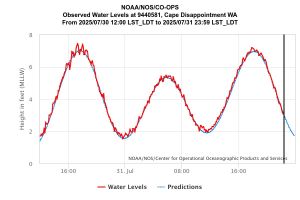Local projects clear key fed funding hurdle: Port of Chinook dredging funds are included
Published 11:34 am Tuesday, August 5, 2025
WASHINGTON, D.C. — Three projects that would support key infrastructure in Pacific County are one step closer to winning crucial congressionally directed funding.
In July, funding totaling about $4.67 million for three “community improvement” projects in Pacific County was passed by the U.S. House Appropriations Committee. They and 11 other projects had been requested by Rep. Marie Gluesenkamp Perez as part of Congress’s Community Project Funding process, commonly referred to as earmarks, in crafting the spending bills for the 2026 Fiscal Year.
The spending bills that the funds for the projects are attached to still must pass the whole House and Senate, which drafts its own spending bills that the two legislative bodies then haggle over, and then be signed into law — a process expected to take months.
Trending
No local projects won congressionally directed funding in the 2025 Fiscal Year, a casualty of the “full-year” Continuing Resolution that was passed on a party-line vote in March and extended government spending levels for the 2024 Fiscal Year through this September. Projects that saw potential funding be lost due to the Continuing Resolution included $1 million to help fund a floating intake system at the city of Ilwaco’s reservoir at the Indian Creek Dam.
Port of Chinook dredging
Of the 14 projects requested by Gluesenkamp Perez (D-Skamania) district-wide, the one that carries the highest cost, at $2.7 million, is for dredging at the Port of Chinook. The funds would be used to remove 65,000 yards of material from the marina to ensure safe passage for vessels to dock as well as reach the boat lift.
“The project is an appropriate use of taxpayer funds because certain slips in the port are currently unusable at low tides, threatening commercial access,” Gluesenkamp Perez stated in her funding request to the committee, which she also serves on. “As a result, port tenants note that a 24-month window remains before they must seek another cargo transit port, threatening the local economy and community.”
The congresswoman’s office received 11 letters of support from local individuals, businesses and organizations in favor of the funding request, including from state Sen. Jeff Wilson, a 19th District legislator. Wilson, (R-Longview) who also serves as a port commissioner in Longview, said the port “is essential to local jobs, seafood production, and economic activity, making its preservation critical for both the regional economy and the national seafood industry.”
“With few U.S. ports dedicated to seafood harvesting, the Port of Chinook is among the most significant, contributing nearly $50 million in catch value annually and supporting dozens of jobs,” Wilson continued. “However, years of silt buildup now threaten its long-term viability, making immediate dredging necessary to maintain its operational capacity. Without action, the port’s functionality — and the economic well-being of the surrounding community — will be severely impacted.”
Trending
Mike Domeyer, the CEO and founder of Ilwaco-based Tre-Fin Day Boat Seafood, also wrote in support of Gluesenkamp Perez’s request. Tre-Fin is one of just two seafood buyers and processors at the Port of Chinook, and Domeyer said dozens of jobs and tens of millions of dollars in catch value are at stake.
“It is crucial to understand that failure to execute this dredging action will ultimately lead to the loss of these existing jobs and catch volumes, potentially resulting in the dissolution of the Port as we know it,” Domeyer added. “The economic impact on our community would be devastating.”
Others that wrote in support of the funding request include the Pacific County Commission; Friends of Chinook School; Columbia River Crab Fisherman’s Association; Bank of the Pacific; Pacific County Economic Development Council; Guy Glenn, Jr., the port’s former manager; Cathlamet resident Jim Bridwell, a port user and member of the Columbia River Recreational Advisory Group; and Chinook residents and port users John Hanson and Valerie Wilson.
Raymond sewage plant repairs
A request for $950,000 to make repairs at the city of Raymond’s wastewater treatment plant was also approved by the House Appropriations Committee last month.
Built in 2013, the plant serves residential and commercial customers in both Raymond and South Bend. But the facility has begun sinking into the ground since its construction, ranging from 3-13 inches in certain areas, which has damaged the plant’s utilities and infrastructure and raised environmental and safety concerns.
Repairs being targeted include replacing piping, valves and other components affected by the plant’s settling.
“The funding would be used to carry out critical repairs, including mitigating the most egregious subsidence-related damage and repairing the underground electrical system,” Gluesenkamp Perez stated in her funding request. “Wastewater treatment is essential for removing harmful bacteria, viruses, and pollutants. Without proper treatment, sewage can contaminate drinking water sources and spread serious diseases.”
The funding request received six local letters of support, including from both the cities of Raymond and South Bend. The Willapa Community Development Association in its letter cited the monthly residential sewer rate as topping $100 per month in Raymond and more than $140 in South Bend, “which is significantly higher than in most other areas in the state.”
“The City does not have the financial reserves to undertake these needed infrastructure repairs,” WCDA stated in its letter. “Without this assistance the City will have to borrow funds to complete this work and pass on the costs to our residents through even higher rates.”
Mary Catherine McAleer, the public affairs manager in Washington and Canada for Weyerhauser, also wrote a letter stating the timber company supported the request.
“A well-functioning Willapa Regional Wastewater Plant is critical infrastructure for the some 5,100 [people] it serves, including our Raymond sawmill, and particularly in an area so close to Willapa Bay, the home of thriving shellfish populations,” stated McAleer. “As a geoduck farmer myself and former Shellfish Protection District member, I can attest that wastewater infrastructure is of the utmost importance.”
Willapa Medical Clinic replacement
A funding request to provide $1.02 million to Willapa Harbor Hospital to support the replacement of its medical clinic was also passed by the House Appropriations Committee.
The funds would go toward paying for the equipment and construction to replace the Willapa Medical Clinic, located at 826 Alder St. in South Bend.
“…North Pacific County is a rural, medically underserved area, and this clinic provides vital access to primary care for residents,” Gluesenkamp Perez stated in her funding request. “The current facilities cannot accommodate additional providers to keep up with growing demand. This project will improve access to timely medical care in the community.”
Letters of support were provided by the city of Raymond, Bank of the Pacific, Raymond Fire Department and multiple local residents. Raymond Mayor Dee Roberts, in her letter, said “the aged facility can no longer support modern medical care.
“The request for support of the Primary Care Clinic, a designated Rural Health Clinic, is vital to the ongoing provision of healthcare to our rural area,” Roberts added. “This proposal is one aspect of a larger project to replace buildings that house both inpatient and outpatient services.”
Bill Didion, Raymond Fire Chief, said the current facilities are unable to keep up with the area’s growing and aging population.
“If we can’t keep up, we will continue to see a trickle-down effect on other systems throughout the community, such as an increase in demand on emergency services and emergency room visits which are already strained,” added Didion, who has worked in the emergency medical field for about 20 years.










